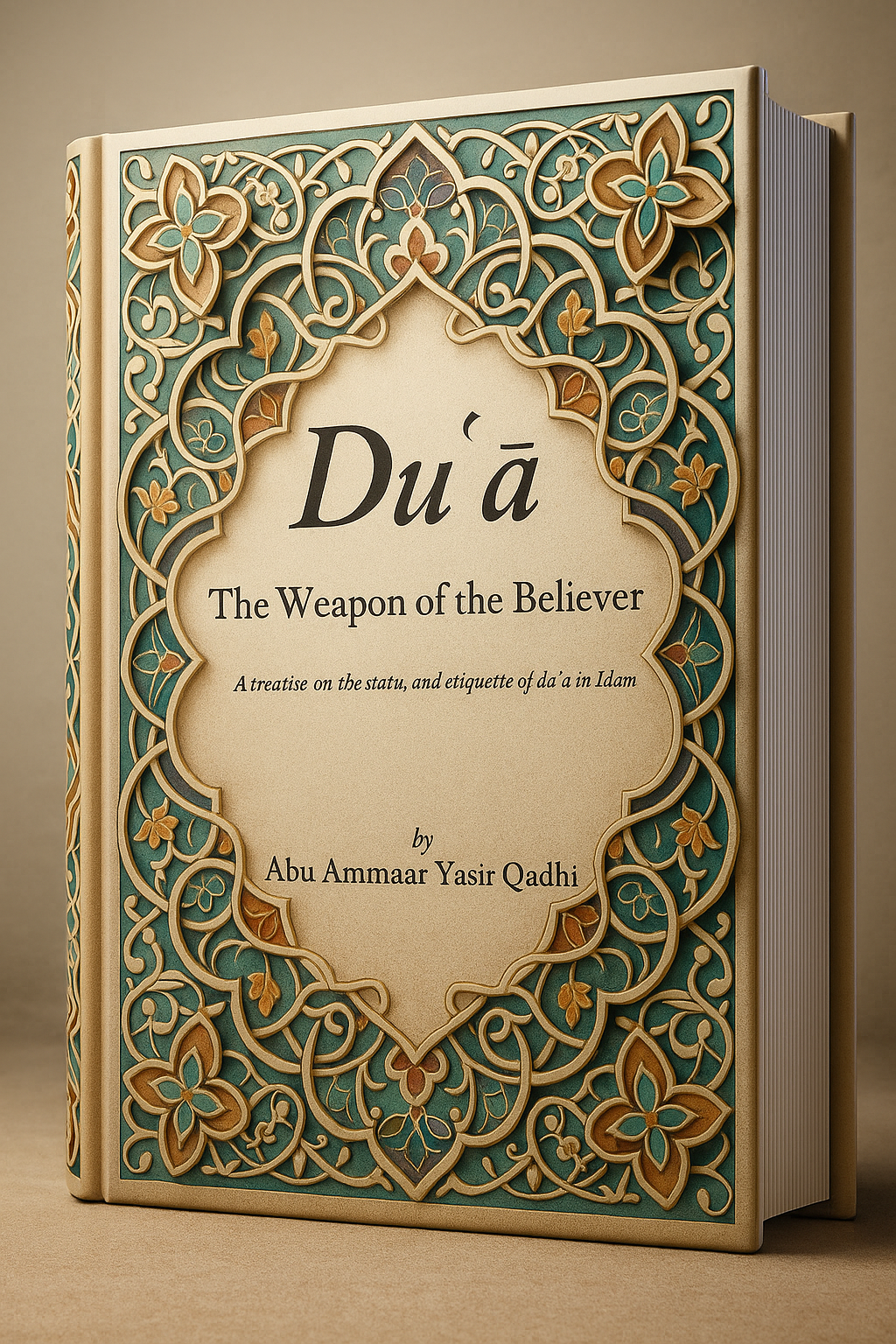Hub For Your Daily Islamic Insights 🕋 🕌

Du'ā: The Weapon of the Believer, A treatise on the status and etiquette of du'ā in Islam
A treatise on the status and etiquette of du'ā in Islam
Free
Discover the transformative power of supplication with 'Du'ā: The Weapon of the Believer' by renowned scholar Abu Ammaar Yasir Qadhi. Elegantly bound in a durable hardcover, this beautifully crafted volume provides a comprehensive exploration of the significance, virtues, and proper etiquette of du'ā in Islam. Perfect for those seeking spiritual enrichment and a deeper connection with their faith, this essential guide offers clear insights and practical advice rooted in authentic sources. Whether you're a lifelong student or new to the practice, this book makes a thoughtful gift and a valuable addition to any Islamic library. Approximate size: 6 x 9 inches. Classic black-and-gold cover design.
### Du'ā: The Weapon of the Believer #### Introduction In the rich tapestry of Islamic spirituality, du'ā holds a place of paramount significance. Often referred to as the "weapon of the believer," du'ā transcends mere supplication; it embodies a deep relationship between the human soul and the Divine. This treatise explores the status and etiquette of du'ā in Islam, highlighting its profound importance in the life of a Muslim. #### The Status of Du'ā in Islam Du'ā is intricately woven into the fabric of Islamic worship and daily life. The Quran and Hadith emphasize its critical role: - **Quranic Foundation**: Allah (SWT) commands in the Quran, "And your Lord says, 'Call upon Me; I will respond to you.'" (Quran 40:60). This verse underlines the fundamental belief that God is always attentive to the believers’ calls, reinforcing the significance of du'ā as an essential part of one’s faith. - **Prophetic Tradition**: In numerous Hadith, the Prophet Muhammad (PBUH) extols the virtues of du'ā, stating that it is the essence of worship. One such narration tells us, "Du'ā is the essence of worship" (Tirmidhi). This indicates that engaging in du'ā is not only an act of seeking help but also a form of glorifying and acknowledging our dependence on Allah. #### The Nature of Du'ā The essence of du'ā lies in its dual nature: it can be a means of seeking guidance, forgiveness, or assistance, and it also serves as an act of gratitude. The believer’s heart pours out its hopes, fears, and aspirations during their supplications. Du'ā is characterized by: 1. **Sincerity and Humility**: The believer approaches Allah with a sincere heart, devoid of arrogance or pride. Du'ā should be made with humility, recognizing one's own limitations and the infinite mercy of Allah. 2. **Intention (Niyyah)**: The intention behind each du'ā plays a crucial role. It is essential that the supplicant's heart is focused and pure, as the intention determines the acceptance of the du'ā. 3. **Persistence**: In Islam, persistence in supplication is encouraged. One should not despair if their du'ā is not answered as expected; patience in waiting for Allah’s decision is a trait of true faith. #### The Etiquette of Du'ā To fully harness the power of du'ā, certain etiquettes must be observed. These not only enhance the quality of the supplication but also signify respect towards the Almighty: 1. **Choosing the Right Time**: While one can supplicate at any time, certain moments are considered particularly auspicious. These include: - **During the Last Third of the Night**: As the Prophet (PBUH) mentioned, Allah descends to the lowest heavens, asking whomever is calling on Him. - **On Fridays**: A blessed day in the week, where du'ā is never rejected. - **After Obligatory Prayers**: The moments immediately following prayer are times for intimate connection with Allah. 2. **Facing the Qiblah**: It is recommended to face the Qiblah (the direction of the Kaaba in Mecca) during du'ā, as it expresses reverence and focus in the act of supplication. 3. **Raising One's Hands**: While raising hands is not a requirement, it is a Sunnah (tradition of the Prophet) that signifies a believer’s humility and eagerness in seeking help from Allah. 4. **Using Beautiful Names of Allah**: When supplicating, one should invoke Allah using His beautiful names, which enhance the emotional and spiritual connection during du'ā. For instance, saying "O Rahman" (O Most Merciful) or "O Al-Wadud" (O Most Loving) can lead to a deeper engagement. 5. **Expressing Gratitude**: Beginning and ending du'ā with gratitude and praise of Allah fosters a spirit of appreciation and humility. A prayer such as "Alhamdulillah" (All praise is due to Allah) serves as a beautiful reminder of His countless blessings. 6. **Being Specific**: While general supplications are indeed beneficial, being specific about one’s needs and desires in a du'ā allows a believer to express their innermost hopes more intensely. 7. **Avoiding Sinful Requests**: It is important to refrain from making du'ā for anything that is sinful or harmful, as such requests negate the principles of purity and righteousness inherent in supplication. #### The Impact of Du'ā Du'ā is not merely an act of asking; it is a transformative process that instills peace, hope, and resilience within a believer. The impact of sincere supplication can manifest in various ways: - **Spiritual Upliftment**: Engaging in du'ā can rejuvenate the heart, strengthen faith, and foster a sense of peace amidst life’s trials. - **Community and Intercession**: Du'ā can also be made for others, creating a sense of community and connectedness among believers. Interceding for others is a virtuous act that can yield immense rewards. - **Healing**: Many believers find solace by turning to Allah in times of illness or hardship, relying on du'ā as a source of healing and support. #### Conclusion In summary, du'ā is a powerful tool for every Muslim, acting as a channel of communication with Allah, embracing sincerity, gratitude, and humility. It is not simply a request for needs but an act of devotion that bridges the believer’s heart to their Creator. By understanding the status and adhering to the etiquettes of du'ā, a believer can truly wield this spiritual weapon, ensuring they remain aligned with their faith amidst the struggles of life. As the Prophet Muhammad (PBUH) reminds us, the essence of worship lies in this intimate, heartfelt communication with our Lord—a reminder that our du'ā truly is the weapon of the believer.
